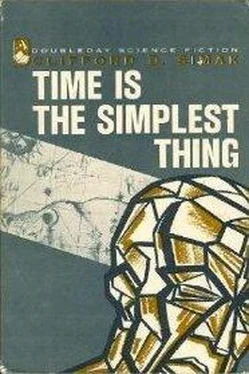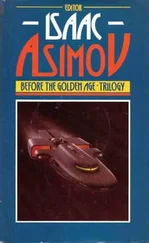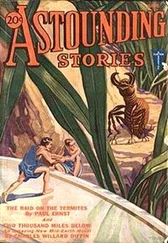“Ain’t it a fact,” Harriet agreed, enthusiastically.
The barkeep subsided into brooding silence.
Blaine took a wild shot in the dark. “Lots of folks in town,” he said. “Big doings?”
The barkeeper settled down into solid conversational stance and his voice dropped to a confidential level.
“You mean you ain’t heard about it?”
“No. Just got in town a couple of hours ago.”
“Well, mister, you won’t believe this — but we got a star machine.”
“A what?”
“A star machine. It’s one of them contraptions that parries use to travel to the stars.”
“Never heard of them.”
“No reason that you should. The only place they’re legal is in Fishhook.”
“You mean this one is illegal?”
“Couldn’t be no more illegal. The state police, they’ve got it down in the old highway shed. You know, the one on the west edge of town. Maybe you drove by it coming in tonight.”
“I don’t remember it.”
“Well, anyhow, it’s there. And then, on top of that, who should show up but Lambert Finn.”
“You don’t mean the Lambert Finn?”
“No one else. He’s up there, in the hotel right now. He’s going to have a big mass meeting out by the highway shed tomorrow. I hear the police have agreed to haul out the star machine so he can preach about it, with it standing there, right out in plain sight of all the people. I tell you, mister, that will be something worth your while to listen. He’ll spout more brimstone than you ever heard before. He’ll lay it on them parries. He’ll take the hide clean off them. They won’t dare to show their faces.”
“Not many of them around, most likely, in a town like this.”
“Well,” the bartender said, drawing out the word, “not many in the town itself. But there’s a place just a ways from here, down by the river. A place called Hamilton. It’s all parry. It’s a new town the parries built. Parries from all over. There’s a name for a place like that — I should know the name, but I can’t remember it. Like the place they used to keep the Jews in Europe.”
“Ghetto.”
The bartender smote the bar with a disgusted hand. “Now, why couldn’t I think of that? Yes, mister, that’s the word. Ghetto. Except in the old days it was in the poor part of a city and now its out in the country, in the poor part of the country. That land down by the river don’t amount to shucks. No place to build a town. But them parries like it down there. Long as they don’t bother no one, no one bothers them. Long as they stay in line, we leave them alone. And we know where they are, and they know we know. Any time things start going wrong, we know right where to look.”
He glanced at the clock. “If you folks want me to start another round, you’ll have time to gulp it down.”
“No, thanks,” said Blaine. He laid two bills on the bar. “Let it ride,” he said.
“Why, thank you, sir. I thank you very much.”
As they slid off the stools, he said: “If I were you, I’d get under cover as soon as possible. The cops will be down on top of you if they catch you out.’
“We will,” said Harriet. “And thanks for the conversation.”
“Pleasure,” said the barkeep. “Pleasure any time.”
Outside the bar, Blaine held the car door for Harriet, then walked around it to get in on the other side.
“The highway shed?” he asked.
“Shep, what would you do there? We’d just get into trouble.”
“I’ll figure out a way. We simply can’t leave that machine there for Finn to preach a sermon over.”
“So I suppose you figure you’ll just haul it off.”
“No, I guess not. It’s too big and clumsy. But there has to be a way. We have to put a crimp in Finn. Somehow, we’ve got to manage.”
“They’ll have a guard.”
“I don’t think so, Harriet. Locked and bolted, but no guard. There isn’t anyone who would stand on guard. This town is plenty scared.”
“You’re just like Godfrey,” she said. “Both of you go around sticking out your necks.”
“You thought a lot of Godfrey.”
“Yes, a lot,” she said.
He started up the engine and swung the car out into the street.
The old highway shed was black and silent and there was nothing to indicate there was anyone around. They rode past it twice to look it over, moving slowly, and it was the same each time — just the big shed standing there, a relic of the days when there were highways to maintain, when there was need of road machinery to keep their surfaces in shape.
Blaine pulled the car off the road and threaded it easily through a willow thicket, set it down and turned off the lights.
Silence closed down on them; the darkness pulsed with quietness.
“Harriet,” said Blaine.
“Yes, Shep.”
“You stay here. Don’t move. I am going up there.”
“You won’t be long? There’s nothing you can do.”
“I won’t be long,” he said. “Have we got a flashlight?”
“There’s one in the glove compartment.”
He heard her fumbling in the dark. The catch on the door of the compartment clicked and the tiny light inside came on. The flashlight lay amid a clutter of road maps, of sunglasses, of other odds and ends.
She handed it to him. He snapped it on to test it, and it worked. He shut it off again and got out of the car.
“Sit tight,” he told her.
“And you,” she warned, “be careful.”
The shed was larger than it had appeared to be when seen from the highway. It was surrounded by a high, rank growth of dead, dried weeds that rustled with stealthy sound in the slightest movement of the air. It was built of the corrugated metal sheets which had been much in use for buildings of this sort before the introduction some three-score years before of the putty-plastic from Aldebaran VII. Occasional windows, begrimed with dirt and ancient spider webs, broke the smooth expanse of metal. Two great upward-folding doors filled almost the entire front exposure.
To the east lay the dark outline of the town, silhouetted against the faint flush in the sky which told of a moon about to rise.
Cautiously, Blaine made a circuit of the building, looking for a way that might allow him to get in. He found nothing that was easy. The two folding doors were locked. There were a few sheets of metal that had loosened at the bottom, but the material was too heavy to allow one to bend it upward and thus create a rathole for a man to sneak inside.
There was, he realized, only one way to get in.
He went to the corner of the building nearest to the road and stood listening. Except for the harsh whispering of the weeds there was nothing to be heard. The highway was deserted and, he knew, most likely would remain so. There was no sign of light — no lamp, no glitter through a distant window. It was as if he and the shed stood in a world where there was no life at all.
He stared for a time at the willow thicket by the road, but there was no glint, no shine, nothing to indicate that a car was hidden there.
He stepped quickly from the corner and moved along the wall of metal until he came to a window. He took off his tattered jacket and wrapped it about his fist and forearm.
Then he struck a blow, and the window shattered. He struck other blows to remove the glass that was still hanging in the frame. Carefully he picked out the remaining splinters that would slash a man trying to crawl in.
Then he went back to the corner and stood there for a moment. The night still was motionless and silent.
Back at the window, he crawled into the shed, let himself down carefully, felt the floor beneath his feet. He took the flashlight from his pocket and turned it on. He swept a swath of light across the empty cavern of the shed’s interior.
Читать дальше








